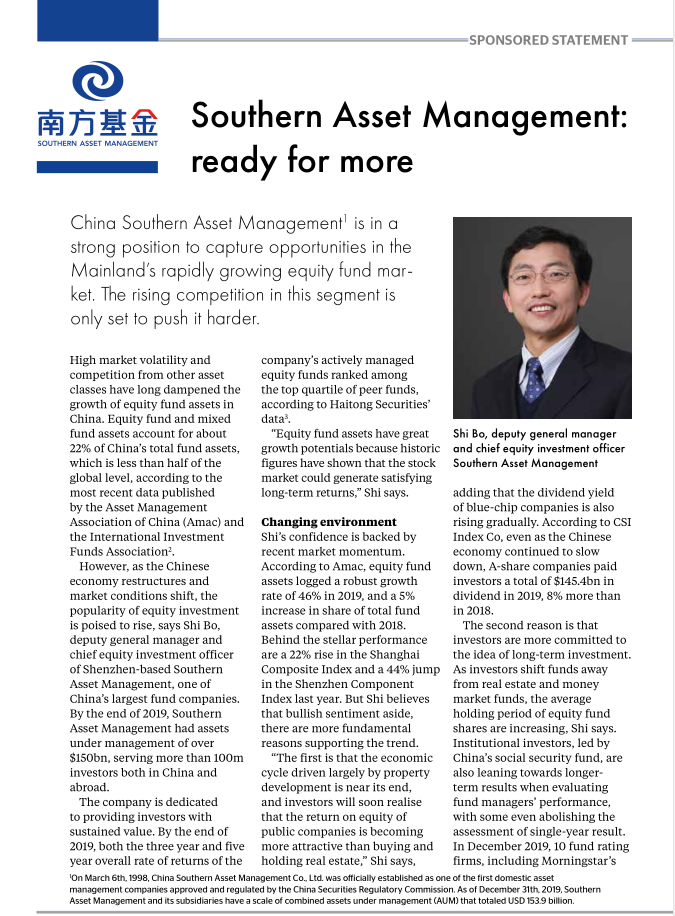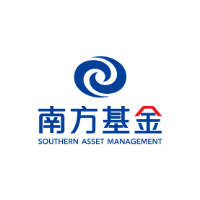2020年5月,Global Capital《环球资本》年刊发布,南方基金副总经理兼首席投资官(权益)史博就关于中国公募基金权益类投资的现状和未来发表观点。

如下为文章全文,中文翻译仅供参考。
长期以来,市场的高波动性以及来自其他资产类别的竞争制约了中国公募基金中权益类资产的增长。
根据中基协和国际投资基金业协会(IIFA)公布的数据, 中国股票和混合类基金资产只占总基金资产的22%, 而在全球范围内,这一比例则要高过一倍。
(注1:中基协和IIFA的数据分别截至2019年12月底和9月底)
High market volatility and competition from other asset classes have long dampened the growth of equity fund assets in China.
Equity fund and mixed fund assets account for about 22% of China’s total fund assets, which is less than half of the global level, according to the most recent data published by Asset Management Association of China (AMAC) and International Investment Funds Association.
但是,南方基金副总经理兼首席投资官(权益)史博表示,随着中国经济结构调整和市场情况的变化,权益类投资的受欢迎程度将会提高。
截至2019年底, 南方基金总资产管理规模超过1500亿美元,服务国内外客户总数量超过1亿。
南方基金的使命是为投资者持续创造价值——根据海通证券提供的数据,截至2019年底,南方基金最近3年和最近5年内的主动管理权益类基金的收益率都排在同类基金中的前25%水平。
(注2:海通证券2020年1月2日发布的基金公司权益及固定收益类资产业绩排行)
However,
as the Chinese economy restructures and market conditions shift, the popularity of equity investment is poised to rise, says Shi Bo, deputy general manager and chief equityinvestment officer of Shenzhen-based SouthernAsset Management,one of China’s largest fund companies.
By the end of 2019, Southern Asset Management had a total AUM of over $150 billion, serving more than 100 million investors both in China and abroad.
The company is dedicated to providing investors with sustained value—by the end of 2019, both the 3-year and 5-year overall rate of returns of the company’s actively managed equity funds ranked among the top quartile of peer funds, Haitong Securities’ data shows.
“历史数据表明,股票市场有较为满意的长期回报。 因此,权益类基金资产有很大的增长潜力,”史博表示。
“Equity fund assets has great growth potentials because historic figures have shown that the stock market could generate satisfying long-term returns,” Shi Bo says.
史博的信心背后是近来市场的表现 。
根据中基协数据,中国权益类基金资产在2019年增长了46%,占公募基金总资产比例也比2018年提高了约5%。
虽然同期内上证指数录得了22%的涨幅,深成指数增长达44%,但史博认为,除了市场涨幅的因素之外,这一趋势背后有更多基本面的原因。
Changing environment
Shi’s confidence is backed by recent market momentum. According to AMAC, equity fund assets logged a robust growth rate of 46% in 2019, and a 5% increase in share of total fund assets compared with 2018.
Behind the stellar performance are a 22% rise in the Shanghai Composite Index and a 44% jump in the Shenzhen Component Index last year, but Shi believes that bullish sentiment aside, there are more fundamental reasons supporting the trend.
原因一
“第一个原因是房地产驱动的经济周期正在进入尾声,投资者很快会意识到,和持有房产的回报率相比,上市公司的净资产回报率的吸引力将越来越高,”史博表示,他还补充说优质上市公司的派息率正逐渐上涨。
根据中证指数的数据,上市公司总派息达到1454亿美元,比2018年增长了8%。
“The first is that the economic cycle driven largely by property development is near its end, and investors will soon realize that the ROE of public companies is becoming more attractive than buying and holding real estate,” Shi says, adding that the dividend yield of blue-chip companies is also on the rise gradually.
According to CSI Index Co., even as the Chinese economy continued to slow down, A-share companies paid investors a total of $145.4 billion in dividend in 2019, 8% more than in 2018.
原因二
第二个原因是投资者对长期投资的理念认同度越来越高。
史博表示,随着投资者将资金从房地产和货币基金中转移出去,他们对权益类基金的平均持有期正在上升。
以社保基金为代表的机构投资者们对基金公司的中长期表现更为重视,其中一些甚至取消了对基金管理者一年期的业绩考核。
2019年12月,包括晨星在内的10家基金评级公司联合发出倡议,宣布将不再基于基金1年期业绩表现颁发奖项,并将引导投资者关注基金的中长期表现。
The second reason is that investors are more committed to the idea of long-term investment.
As investors shift funds away from real estate and money market funds, the average holding period of equity fund shares are increasing, Shi says.
Institutional investors, led by China’s social security fund, are also leaning towards longer-term results when evaluating fund managers’ performance, some of them even abolished the assessment of single-year result.
In December, 10 fund rating firms, including Morningstar’s China branch, announced in a joint open letter that they would stop awarding funds based on their annual performance; instead, they pledged to help lead investors’ attention to longer-term yield of the funds.
原因三
第三个原因是中国政策制定者已将鼓励权益投资发展和价值投资理念作为重点工作之一。
去年9月,为了支持权益类基金发展,中国证监会发布了新的规则,极大简化了符合条件的权益类基金的注册流程。今年1月的工作会议中,证监会重申了增加权益类基金资产比例和中长期权益类投资资金来源的重要性。
“无论是监管方、投资者还是基金管理方,可以感受到大家的理念都在转变,”史博表示。
Last but not least, promoting equity investment and the idea of value investing is a priority for Chinese policy makers.
Last September, China Securities Regulatory Commission, or the CSRC,
rolled out new rules to greatly simplify registration process for qualified equity funds in support of their growth; in a meeting this January, the regulative body reiterated the importance of increasing the share of equity fund assets and expanding the source of mid-to-long term funds.
“Regulators, investors and fund managers…you can feel that everyone’s mindset is changing,” Shi says.
为了把握权益类投资增长带来的巨大机遇,南方基金推出了一系列以高端制造、医药健康和消费等行业为主题的基金产品。
去年4月,中国科创板正式开板,南方基金是首批7个获批发行科创板主题基金的公司之一,并成功募集了10亿元的基金; 该基金的超募倍数超过23倍。
截至1月中旬,该基金的回报表现领先于同类基金。
Harnessing the power of research
To capture this gigantic opportunity, Southern Asset Management has been bringing out new equity funds focused on sectors such as advanced manufacturing, healthcare and consumption.
When China’s STAR board kicked off last April, the company is among the first seven managers that received approval to launch STAR-related themed funds, successfully fulfilling its quota of $140 million; the fund was oversubscribed by more than 23 times.
Until mid-January, the fund is leading its peers in investment returns as well.
“我们认为行业主题基金拥有很大潜力。 和一级市场投资人一样,我们的基金经理得以深耕某些特定产业,当他们深入学习某个产业并成为专家之后,才能在基金规模和投资回报之间取得较好的平衡。 ”
“We believe funds with a clear sector focus have the most potentials,” says Shi Bo, who started managing funds since 2004. “Sector funds allow managers to deep dive into certain industries just like many of the primary market investors do. Only when managers study and become real experts of the sector, can they achieve a fine balance between investment returns and fund size. ”
“另外,我们还推出了更多设置了1-3年锁定期的基金。这些产品能帮助投资者抑制他们的投机冲动;一旦他们意识到锁定期对他们可以是有益的,那么他们就会自愿地接受长期投资的理念。”
“We are also rolling out more funds with lock-up periods from 1-t0-3 years. These funds will help investors curb their impulsion to speculate, and once they realize that lock-up periods can be beneficial for them, they may voluntarily lengthen their investment perspective,” Shi explains.
史博表示,南方基金根据投资风格和行业将基金经理和研究员分组,更好地促进团队内部的交流和协同。
同时,他也鼓励跨团队之间的头脑风暴和辩论,以便互相之间带来新的看法和启发。
Shi says that at Southern Asset Management, fund managers and researchers are divided into different groups based on investment styles and the sectors they cover, which facilitates communications and synergies within the teams.
At the same time, Shi says he encourages brainstorming and debate between different groups of managers, which helps them give each other new perspectives and ideas.
“作为中国历史最长的基金公司之一,研究是融入我们DNA的。我们有很好的以老带新的文化,这使得我们长期积累的知识和经验能顺利地传承。”
“As one of the oldest fund companies in China, research is in our DNA,” Shi says.
“And we have a great culture of apprenticeship, which ensures that our rich knowledge and experience are passed on to the fresh blood.”
南方基金并不是唯一趁势布局的基金公司。
中国市场一向以竞争激励著称,而在中国进一步开放金融市场之后,例如贝莱德、富达等国际基金公司也正在加速进入中国。
有些分析者认为外资全资基金公司很快将与中国本土公司在投资、资金募集和人才招募方面展开竞争。
Competition is motivation
Southern Asset Management is not the only fund companies trying to take advantage of the rising tide.
The Chinese market is known for extremely fierce competition, and now global fund houses such as BlackRock and Fidelity are also eyeing for a piece of the pie, after China decided to lift the limits on foreign shareholding of fund companies in 2020.
Some analysts expect that WOFE-funds will soon start rivaling against domestic firms in investing, f und raising and perhaps more importantly talent acquisition.
“我预计在3年左右的时间,外资基金公司将对中国基金行业带来深远的影响,”史博表示。
但他认为这些影响是积极的——他认为全球知名的基金公司能够推动诸如ESG投资等先进理念在中国的发展,并促使投资者更趋向理性化和长期化。
史博认为,国际竞争者的加入将加速中国权益类基金资产的增长。
“My prediction is that in three years, foreign fund companies could generate profound impact on our industry,”
but in a good way, Shi says, elaborating that globally established fund houses could bring in leading investment philosophies such as ESG investing, which may help make market participants more rational and long-term focused.
Shi believes that the entrance of global challengers will only accelerate the growth of equity fund assets in China.
“竞争对我们来说是好事;谁是领导者,这只有市场说了算,压力会成为动力,促使我们表现更好。”
“Competition is a good thing for us; for what we do, no one but the market can decide who the real leader is. The pressure will help us bring out our ‘A’ game.” Shi says.
